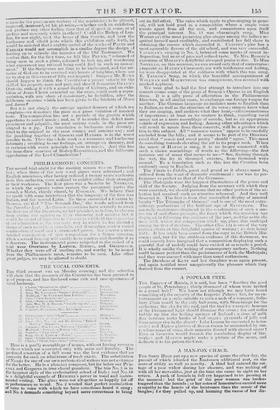PHILHARMONIC CONCERTS.
THE second trial-night fur the ensuing season was on Thursday last; when three of the new veal pieces were rehearsed ; and English musicians, after having suffered a twenty years' exclusion from this orchestra, were suffered to exhibit either their strength or flair weakness. The first piece was a Sestetto by NOVELI.O, in which the soprano voices sustain the prominent parts; the second, a Motet, chiefly choral, by IlousLay. We believe (but we speak with some hesitation) that the language of the first was Italian, and the second Latin. To these succeeded a Cantata by
BI " The Seventh Day," the words selected from the Parw/im.,1,/prt. As thac c:.nTosiiions have severally to await the deei.,ion of the Diteeti.rs, we had intruded, as licrore, to tlbs'ain from giving any (;jdni•,,; on C.:it. (diameter and inei-its: bet it would be an act of !:co to ;;Isnog to v. ithhold the C:pi*:'atuu
of our admiration a • the t: ;t way in which he lin, treated it theme of such once Ll. combination of vocal ;iLgl i .trunwetal power. We reserve a more detailed exalt:hi:IC:at et' this C;)e3poshion fir a future occasion, when a second hear :fig will enable us to titialyze awl describe it as it deserves. The instrumental pieces subjected to the ordeal of a nial were Overtures by LATOUR, Reerse, and GRIESBACIL Whether they were all of sterling ore, and worthy to be issued from the Philharmonic mint, remains to be seen. Like other great judges, we may be allowed to doubt.




















 Previous page
Previous page